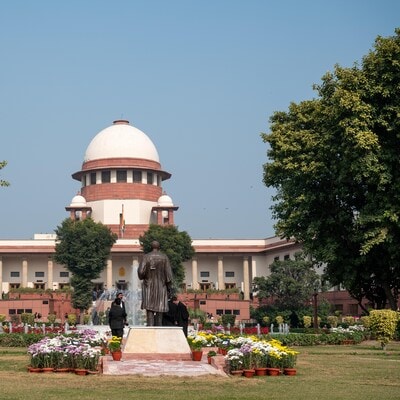South Carolina Supreme Court (Photo: Shutterstock)
In a landmark judgment on Friday, August 23, the Supreme Court of India announced that relaxed bail provisions for first-time offenders under the Bharatiya Nagarik Suraksha Sanhita (BNSS) will be given retrospective effect. This decision means that even offences committed before the BNSS came into force on July 1, 2024, will be subject to these provisions, offering potential relief to numerous awaiting trial prisoners across the country, The Indian Express reported.
Under this judgment, first-time offenders arrested in ongoing criminal cases can now apply for bail under the provisions of the BNSS, thereby significantly reducing the period of detention required before release. This could have far-reaching implications for India’s prison system, which is currently facing severe overcrowding.
According to the National Crime Records Bureau (NCRB) 2022 report, India’s 1,330 prisons are functioning at 131.4 per cent of their capacity, and about 75 per cent of the 573,200 inmates are awaiting trial. The Supreme Court’s decision could provide much-needed relief to these overcrowded prisons by expediting the release of eligible pretrial prisoners.
BNSS provisions on bail for prisoners awaiting trial
Both the National Security Law and the now-replaced 1973 Code of Criminal Procedure contain provisions limiting the maximum period for which a pretrial prisoner may be detained. Under these laws, if a trial or investigation is pending, a pretrial prisoner must be released on bail if he or she has already served half of the maximum sentence prescribed for the offence, unless the offence is punishable by death or life imprisonment.
The BNSS Act introduces a crucial change for first-time offenders (those who have never been convicted before): it reduces the period of detention before they can be released on bail. Specifically, if the individual has served one-third of the maximum sentence for the alleged offence, he or she “shall be released on bail by the court”.
Supreme Court ruling and its implications
This judgment follows the ongoing case on inhuman conditions in Indian jails, which the Supreme Court has been monitoring since 2013. The case was initiated following a public interest litigation (PIL) that highlighted issues such as overcrowding in jails, unnatural deaths and shortage of trained staff.
On August 13, 2024, Senior Advocate Gaurav Agrawal, appointed as amicus curiae, urged the Court to expeditiously implement Section 479 of the BNSS to address the issue of overcrowding. Additional Solicitor General Aishwarya Bhati confirmed the Union government’s support for this move and stated that the provisions should apply to any person awaiting trial who has served one-third of his or her prison term.
The bench, comprising Justices Hima Kohli and Sandeep Mehta, directed the jail superintendents to process the applications of all eligible pre-trial prisoners within three months.
First published: August 27, 2024 | 17:23 IS
Disclaimer:
The information contained in this post is for general information purposes only. We make no representations or warranties of any kind, express or implied, about the completeness, accuracy, reliability, suitability or availability with respect to the website or the information, products, services, or related graphics contained on the post for any purpose.
We respect the intellectual property rights of content creators. If you are the owner of any material featured on our website and have concerns about its use, please contact us. We are committed to addressing any copyright issues promptly and will remove any material within 2 days of receiving a request from the rightful owner.

